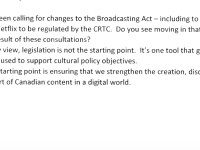Donald Trump’s stunning win of the U.S. Presidency on Tuesday night has sparked numerous articles speculating about the implications for various policies and issues. Given how little Trump said about digital policy, predictions about telecom or IP policy are little more than educated guesses. Trade policy was a major Trump issue, however, as his opposition to the Trans Pacific Partnership and vow to renegotiate NAFTA was repeated at virtually every campaign stop. Senate Majority Leader Mitch McConnell confirmed yesterday that the TPP would not be brought up for a vote this year, leaving Trump to decide on its future. Officials in other TPP countries such as Australia, New Zealand, and Malaysia have now acknowledged that the TPP is likely dead.

Fair Dealing by Giulia Forsythe (CC BY-NC-SA 2.0) https://flic.kr/p/dRkXwP
Copyright
The Missing Public Voice: My Comments on the Copyright Board at the Senate Banking Committee
The Senate Standing Committee on Banking, Trade and Commerce conducted two days of hearings last week on the Copyright Board of Canada. The hearings featured members from the Board, leading copyright collectives and associations, and a panel of individuals that included law professors and practitioners. Ariel Katz and Howard Knopf have already posted their opening remarks. My comments, which focused on the importance of the public interest in Copyright Board decision making and the need for greater public participation, is posted below.
Why Copyright Reform Won’t Solve the Troubles Faced By the Newspaper Industry
Last week, I appeared before the Standing Committee on Canadian Heritage as part of its study on the future of media. The committee has heard from dozens of witnesses and one of the surprising themes has been the emphasis on copyright reform as a potential solution to the newspaper industry’s woes. My opening remarks, which are posted below, warn against the reforms, including the prospect of new taxes on Internet services or linking as a source of revenue for the industry. Instead, I point to several potential policies including an ad-free online CBC, sales taxes for digital services, and non-profit funding models for investigative journalism.
The Q & A that followed with me focused primarily on copyright law. The copyright discussion stems from the fact that several earlier witnesses implausibly claimed that it would help solve the problems facing news organizations. For example, Bob Cox of the Canadian Newspaper Association told the committee:
Behind the Scenes of the Digital CanCon Consultation: No Netflix Regs, CRTC Review or Copyright Overhaul
Canadian Heritage Minister Melanie Joly launched her review of CanCon rules last spring by stating that “everything is on the table.” The pre-consultation revealed a sharp divide between industry and the public with industry stakeholders emphasizing more public and government support and the public focusing on efforts to promote Canadian content.
This week I obtained government documents under the Access to Information Act that provide some interesting insights in the behind-the-scenes process that brought a major government consultation from concept to launch in a matter of weeks. The roughly thousand pages show Canadian Heritage officials worked long hours to develop timelines, consultation documents, communications plans, and advisory committees. Given the time constraints, it is an impressive effort.
The documents also highlight internal thinking on several major issues, including Netflix regulation, the CRTC’s Let’s Talk TV rulings, and copyright.
Not a Free for All: Canadian University Libraries Spending Hundreds of Millions on Licensing
As students across Canada head back to school this week, the Canadian Association of Research Libraries (CARL), which represents 31 member libraries, issued a reminder that Canadian education spends hundreds of millions of dollars every year on content licensing. Access Copyright and the publishing community have tried to paint the Canadian situation as a free-for-all, but the reality is that educational institutions, libraries, and students are still buying books and licensing content. In fact, recent U.S. data shows that textbook costs are increasing far faster than any other education cost.
The CARL release states:
The 31 member libraries of the Canadian Association of Research Libraries (CARL) spent $293 million on information resources in 2014-15, demonstrating a clear commitment to accessing print and digital content legally and rewarding content owners accordingly. Universities are actively engaged in outreach to their faculty, staff, and students, educating them on their rights and responsibilities under the Copyright Act and ensuring that uses of material under copyright fall well within the provisions of the law. Where educational uses are more substantive and therefore fall outside of fair dealing, the content is either purchased to be added to licensed collections, or rights clearances are obtained and royalties are paid for these uses. Trained, knowledgeable library staff support these activities.
Some voices in the publishing community and associated lobbyists have stated in the media that the education market has evaporated as a result of users’ fair dealing rights. This is inaccurate. Universities continue to buy and to license access to published works, at substantial cost, using public funds and student tuition dollars.











